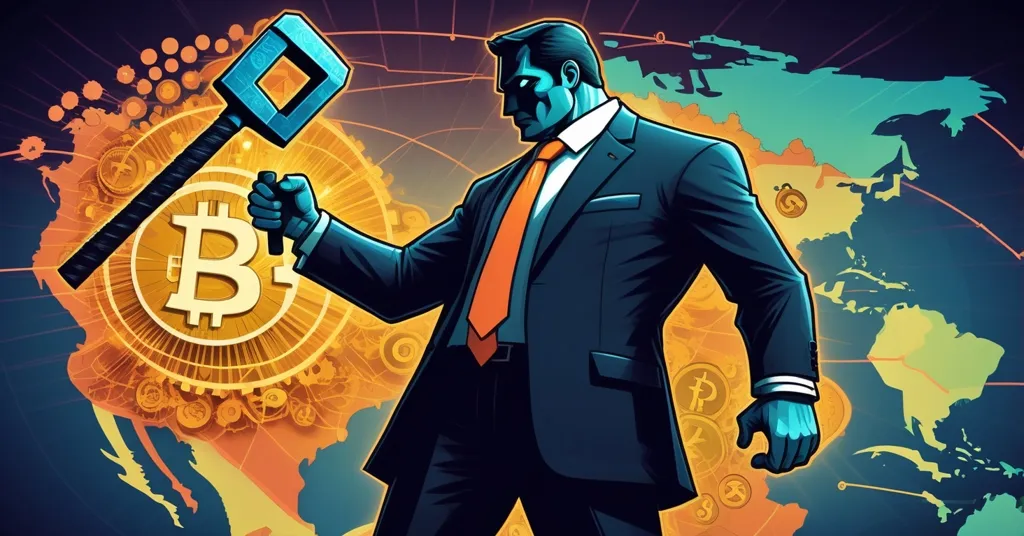Trump’s 50% Tariff Threat on Brazil Ignites Sovereignty Clash and Bitcoin Interest

Trump’s Tariff Threat Fuels Brazil’s Sovereignty Battle and Sparks Bitcoin Buzz
Donald Trump’s audacious threat to hit Brazil with 50% tariffs unless charges against his ally, former President Jair Bolsonaro, are dropped has ignited a fierce standoff with Brazil’s judiciary. Announced on July 9, 2025, this brazen move has not only strained U.S.-Brazil ties but also raised the stakes for national sovereignty, economic stability, and even the potential for Bitcoin and decentralized tech to step in as a financial lifeline amid escalating tensions.
- Tariff Ultimatum: Trump demands dismissal of coup charges against Bolsonaro, threatening 50% tariffs on Brazilian goods effective August 1, 2025.
- Brazil’s Resolve: The Supreme Federal Court and President Lula stand firm, rejecting U.S. interference while advancing legal action against Bolsonaro.
- Crypto Connection: Economic fallout from a trade war could drive Bitcoin adoption in Brazil as a hedge against inflation and currency chaos.
Trump’s Heavy-Handed Play and Brazil’s Pushback
Let’s cut to the chase: Trump’s tariff threat is less about trade and more about protecting a political buddy. Jair Bolsonaro, Brazil’s former president and a right-wing populist often likened to Trump, faces serious charges tied to an alleged coup attempt on January 8, 2023. Trump’s ultimatum, delivered with the subtlety of a sledgehammer, insists Brazil’s Supreme Federal Court drop the case or face economic pain. This isn’t just meddling—it’s a full-on assault on Brazil’s right to handle its own legal affairs, what many call judicial sovereignty, or simply put, a nation’s freedom to make its own court decisions without foreign bullies sticking their nose in, as detailed in this report on Trump’s tariff threat sparking a sovereignty fight.
The timing was a gut punch. Brazil’s highest court was on recess when Trump dropped this bombshell, forcing justices into emergency huddles. Leading the charge is Justice Alexandre de Moraes, a no-nonsense figure who’s become a lightning rod for criticism from Bolsonaro’s camp and now Trump himself. They’ve painted Moraes as orchestrating a “witch hunt,” but he and his colleagues aren’t blinking. On July 14, 2025, the Prosecutor General’s Office pushed forward with final arguments for Bolsonaro’s conviction, with a verdict expected in August after the court reconvenes. To top it off, they slapped an ankle monitor on Bolsonaro, labeling him a flight risk—a move he’s called “humiliating” while stewing under tight restrictions. More on Moraes’ role and the case can be found in this detailed update on Bolsonaro’s coup attempt charges.
Brazil’s President Luiz Inácio Lula da Silva didn’t hold back either. Facing his own domestic headaches with low approval over rising food costs, Lula seized this moment to rally national pride against U.S. overreach. His words were sharp and clear, a middle finger to external pressure.
“Brazil is a sovereign country with independent institutions.” — Luiz Inácio Lula da Silva
But Trump doubled down. Beyond tariffs, the U.S. State Department revoked visas for Moraes and other justices involved—a petty jab that screams desperation. In a public letter, Trump demanded not just a halt to the trial but an end to what he calls Brazil’s “ridiculous censorship regime,” a dig at ongoing clashes over disinformation on platforms like X. Apparently, travel bans are the new diplomacy, but here’s the kicker: Bitcoin transactions don’t need a passport. The impact of these visa revocations on Brazilian justices has stirred significant debate.
“It is my sincere hope that the Government of Brazil changes course, stops attacking political opponents, and ends their ridiculous censorship regime. I will be watching closely.” — Donald Trump
A Dark Chapter: Bolsonaro’s Legal Mess
To understand why this case has Trump so riled up, rewind to January 8, 2023. Thousands of Bolsonaro supporters, fueled by his baseless claims of electoral fraud, stormed Brazil’s Supreme Court, Congress, and presidential palace in Brasília. The scene was chillingly reminiscent of the January 6, 2021, U.S. Capitol riot—a violent attempt to upend democracy. Bolsonaro had already been banned from running for office until 2030 by Brazil’s electoral court for spreading disinformation about the voting system, a masterclass in gaslighting that eroded trust. By November 2024, federal police recommended coup charges, cementing this as a pivotal test for Brazil’s democratic backbone. The broader context of this trade conflict tied to Bolsonaro’s charges paints a grim picture.
Bolsonaro’s allies aren’t sitting idle. His son Eduardo and conservative commentator Paulo Figueiredo, grandson of a former military dictator, have been lobbying hard in Washington. Their message? If Brazil doesn’t cave, Trump might escalate, even targeting financial markets. It’s a stark warning of deeper economic warfare.
“Everyone’s position was unanimous: There will not be a millimeter of concession unless Brazil takes the first step. The warning we heard was: ‘If things continue at this pace, President Trump may take additional measures, which could even involve the financial market.’” — Paulo Figueiredo
Yet, this pressure seems to have backfired. Analyst Thiago de Aragão of Arko International points out that Trump’s strong-arm tactics have only hardened the Brazilian judiciary’s resolve to see this through, no matter the cost, as discussed in various online forums about Trump’s tariff threats.
“If there was some expectation that the threats would generate some fear in the Brazilian Supreme Court, the effect is the opposite. Their willingness to go through this all the way to the end is much higher.” — Thiago de Aragão
Economic Fallout: A Perfect Storm for Bitcoin?
Here’s where the rubber meets the road for everyday Brazilians. The U.S. racked up a $7.4 billion trade surplus with Brazil in 2024, with total trade hitting $92 billion, making Brazil the second-largest U.S. trading partner in Latin America. A 50% tariff could be a wrecking ball, driving up inflation—think higher prices for food, medicine, and fuel, squeezing wallets already stretched thin. Lula’s hinted at retaliatory levies on American goods, a tit-for-tat that could hurt both sides. For the average citizen, this isn’t just politics; it’s survival. Insights into the economic implications of Trump’s tariff ultimatum highlight the severity of the situation.
Enter Bitcoin and decentralized finance (DeFi). For those new to the space, Bitcoin is a digital currency that runs without banks or governments, often used as a safe haven when traditional money falters. In Latin America, economic crises have historically pushed folks toward crypto—Venezuela saw Bitcoin transactions spike 300% during 2018 hyperinflation, per Chainalysis data, while Argentina’s 2022 currency crash tripled LocalBitcoins volumes. Brazil, no stranger to volatility, could follow suit. If the real tanks by, say, 20% under tariff pressure, peer-to-peer Bitcoin trading might surge as a way to store value or send money across borders without relying on shaky financial systems. Discussions on the potential for Bitcoin adoption amidst tariff impacts are gaining traction.
But let’s not get carried away with hopium. Crypto adoption isn’t a silver bullet. Brazil’s 2023 crypto tax laws signal regulatory wariness, and internet access disparities mean not everyone can jump on the Bitcoin bandwagon. Plus, BTC’s price swings can burn the unprepared—hardly a comfort when you’re dodging inflation on groceries. Still, for tech-savvy Brazilians or businesses dodging trade chaos, tools like the Lightning Network—a layer on Bitcoin for fast, cheap transactions—could be a game-changer for remittances or payments. As a Bitcoin maximalist at heart, I’ll argue it’s the purest hedge against centralized nonsense, though I’ll tip my hat to Ethereum’s smart contracts for potential decentralized governance apps that could record legal proceedings transparently amid this mess.
Blockchain as a Shield for Sovereignty
Zooming out, this U.S.-Brazil clash isn’t just about tariffs or one man’s fate; it’s a glaring warning about global power plays. The U.S. trying to muscle into a foreign court case is a gut punch to smaller nations, setting a precedent that could ripple worldwide. Could blockchain tech offer a counter? Absolutely. Decentralized systems, where data lives on a tamper-proof ledger no single entity controls, could protect national autonomy. Think Estonia’s e-governance model, using blockchain for secure public records, or Cardano’s identity solutions—Brazil could adapt similar tools to shield legal processes from external meddling. Proposals for a national Bitcoin reserve in Brazil are already being floated as an economic safeguard.
Then there’s the disinformation angle. Bolsonaro’s ban for election fraud lies ties into a global tug-of-war over free speech versus censorship, a fight playing out between Moraes and figures like Elon Musk over X’s content policies. Blockchain-based platforms could cut through this noise by ensuring verifiable, transparent information without top-down gatekeepers. It’s not hard to envision a decentralized social media or voting system that logs claims or ballots immutably, dodging both government overreach and foreign propaganda. It’s a long shot, sure, but in a world where tariffs double as political weapons, such tech feels less like sci-fi and more like necessity. For background on related policy discussions, check this overview of tariffs under Trump’s administration.
Public Sentiment and Political Chess
Brazil’s domestic pulse adds another twist. Bolsonaro retains a die-hard base, even outpolling Lula slightly in pre-2025 surveys within margin of error. But as political scientist Rosana Pinheiro-Machado notes, tying his fate to Trump’s tariff threats risks alienating moderates who’ll feel the economic pinch. Meanwhile, pollster Andrei Roman suggests Trump’s antics have handed Lula an “anti-Trump bump,” reframing the narrative around nationalism and briefly shoring up his image. Yet, if trade pain drags on, that goodwill could vanish, with blame possibly shifting to Lula’s administration. It’s a high-stakes game, and for many caught in the crossfire, Bitcoin might just be the wildcard to sidestep the carnage.
Key Questions and Takeaways
- Why did Trump threaten Brazil with tariffs?
Trump’s 50% tariff threat on July 9, 2025, aims to shield ally Jair Bolsonaro from charges over a 2023 coup attempt, reflecting personal loyalty over diplomatic norms. - How is Brazil’s judiciary responding to U.S. pressure?
Led by Justice Alexandre de Moraes, the Supreme Federal Court is unwavering, advancing Bolsonaro’s case with a verdict expected in August 2025 despite visa revocations and tariff warnings. - What economic risks does Brazil face from this conflict?
With $92 billion in annual trade at stake, tariffs could spike inflation, raising costs for essentials like food and fuel, and potentially pushing citizens toward Bitcoin as a financial hedge. - How could Bitcoin and decentralized tech help in this crisis?
Bitcoin could act as a store of value or cross-border payment tool amid currency volatility, while blockchain systems might safeguard legal and governance processes against foreign interference. - What are the broader implications for global sovereignty?
U.S. meddling in Brazil’s courts challenges national autonomy, possibly inspiring other nations to adopt decentralized tech like blockchain for independent, tamper-proof systems.
This showdown is a stark reminder of how fragile the balance between global influence and national independence can be. Brazil’s defiance against Trump’s bully-boy tactics might embolden other countries to stand their ground, perhaps leaning on cryptocurrency to blunt economic leverage. But make no mistake—the road ahead is messy. Will Brazil turn to Bitcoin as an economic shield, or will political games crush the crypto dream? The clock’s ticking, and the world is watching.



